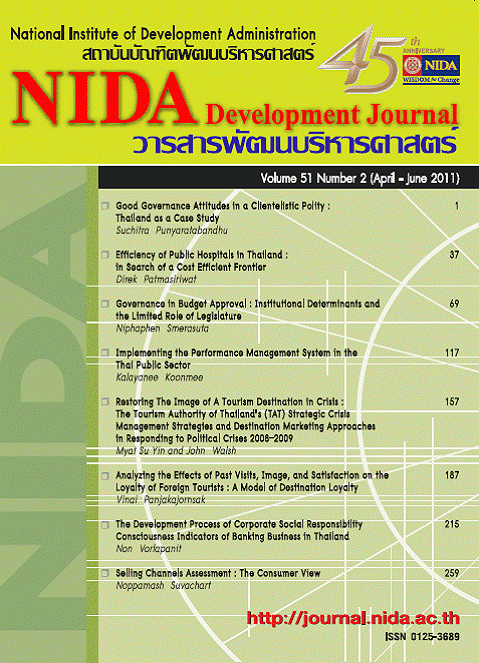Governance in Budget Approval: Institutional Determinants and the Limited Role of Legislature ธรรมาภิบาลในการอนุมัติงบประมาณของรัฐสภา: ตัวกำหนดทางสถาบันและบทบาทที่จำกัดของฝ่ายนิติบัญญัติ
Keywords:
Governance, Budget Approval, Parliament, ThailandAbstract
This paper is a part of the dissertation topic “An Analysis of Governance in Budget Approval by the Parliament of Thailand.” In this paper, a concept of budget governance is reviewed. The emphasis is placed on the concept of accountability, which the Members of Parliament (MPs) should have when approving the budget under the representative democracy. Based on the literatures, the concept of governance in budget approval is presented. The emphasis is also particularly placed on finding what are the institutional factors obstructing governance in budget approval by the parliament. With respect to the literatures of political agency theory, new institutional economic theory, public choice theory, organizational decision-making theory, and empirical researches on budgetary process, institutional related factors of governance of budget approval proposed in this paper are composing of 1) laws and regulations; 2) the legislature’s procedures; 3) arrangement of Budget Scrutiny Committee; 4) provided information; and 5) supporting staff.
An analysis through the five institutional factors would show the readers the limited role of legislature in reviewing or approving an annual budget. With the institutional constraints, the budget approval process is flawed as it does not relate to the outcome of the government’s budget strategies. The budget approval process does not totally disclose to public. Besides, an adherence to the legal framework as well as the responsibility of the MPs in doing approve the budget are questioned. In order to solve these problems, this study suggests that a reform blueprint which emphasizes an improvement in related-institution should be formulated. The recommendations for further development, thus, are proposed. In addition, this study aims to serve as an essential starting point for building a more robust empirical base that will significantly increase the knowledge of governance in budget approval. Theoretical contribution of the study is presented in the final part.
บทความนี้เป็นส่วนหนึ่งของวิทยานิพนธ์เรื่อง “การวิเคราะห์ธรรมาภิบาลในการอนุมัติงบประมาณของรัฐสภาไทย” โดยได้ศึกษาแนวความคิดธรรมาภิบาลของงบประมาณ และหลักความรับผิดชอบ (Accountability) ของสมาชิกสภาผู้แทนราษฎรในระบอบประชาธิปไตยแบบตัวแทน เพื่อนำมาสร้างกรอบแนวคิดธรรมาภิบาลในการอนุมัติงบประมาณของรัฐสภา นอกจากนั้นยังได้ทบทวนวรรณกรรมที่เกี่ยวข้อง ได้แก่ ทฤษฎีตัวแทนทางการเมือง ทฤษฎีเศรษฐศาสตร์สถาบันแนวใหม่ ทฤษฎีทางเลือกสาธารณะ ทฤษฎีการตัดสินใจขององค์การ และการวิจัยที่เกี่ยวข้องกับกระบวนการงบประมาณ เพื่อศึกษาถึงปัจจัยที่จะใช้เป็นกรอบในการวิเคราะห์ธรรมาภิบาลในการอนุมัติงบประมาณของรัฐสภา โดยในบทความนี้ ปัจจัยที่เกี่ยวข้องประกอบด้วย 1) กฎหมายและระเบียบ 2) กระบวนการนิติบัญญัติ 3) รูปแบบของคณะกรรมาธิการพิจารณางบประมาณที่จัดตั้งขึ้น 4) ข้อมูลข่าวสาร และ 5) เจ้าหน้าที่ที่ทำงานสนับสนุน
การวิเคราะห์การอนุมัติงบประมาณของรัฐสภาไทยด้วยปัจจัยทางสถาบันทั้ง 5 จะทำให้ผู้อ่านได้เห็นถึงบทบาทของรัฐสภาในการพิจารณาอนุมัติงบประมาณรายจ่ายประจำปีที่มีอยู่อย่างจำกัด และด้วยข้อจำกัดต่าง ๆ ที่นำเสนออาจเป็นสาเหตุที่ทำให้การพิจารณาอนุมัติงบประมาณของรัฐสภาไม่ได้มุ่งไปสู่ผลลัพธ์ของยุทธศาสตร์การจัดสรรงบประมาณของรัฐบาล การพิจารณาอนุมัติงบประมาณจึงไม่มีประสิทธิภาพ ไม่ได้เปิดเผยข้อมูลการพิจารณาอนุมัติงบประมาณทั้งหมดให้กับสาธารณะรับทราบ นอกจากนี้ ในบทความนี้ยังได้ตั้งคำถามเกี่ยวกับการปฏิบัติตามกฎหมายและความรับผิดชอบของสมาชิกสภาผู้แทนราษฎรต่อการอนุมัติงบประมาณ และได้นำเสนอข้อเสนอแนะเพื่อการปรับปรุงปัจจัยต่างๆ ที่เกี่ยวข้องไว้ การศึกษาในครั้งนี้มุ่งหวังที่จะเป็นจุดเริ่มต้นหนึ่งที่ช่วยพัฒนาองค์ความรู้ในด้านดังกล่าวจากประสบการณ์ที่เกิดขึ้นจริง ในส่วนสุดท้ายของบทความได้นำเสนอความเชื่อมโยงของผลการวิเคราะห์ไปยังทฤษฎีต่าง ๆ ที่เกี่ยวข้องที่ได้กล่าวมาข้างต้น





